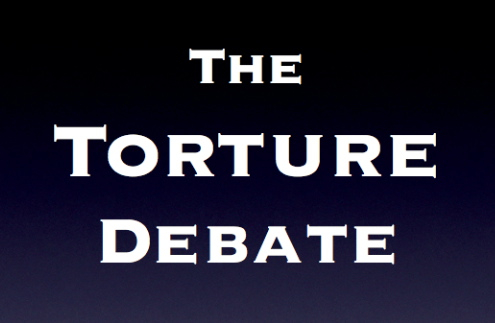For all of the wrong reasons, torture has been in the national news this past week. First, President Obama nominated John Brennan as the new director of the CIA, a man who embraced and defended the Bush Administration’s use of torturous “enhanced interrogation techniques” (before joining the current White House and becoming a leading advocate for drones and extrajudicial assassinations). Second, we observed the eleventh anniversary of the opening of the U.S. detention facility at Guantanamo Bay, Cuba, where over 100 of the men and boys brought there as part of our “war on terror” still remain — abused and indefinitely detained without trial in the military prison despised around the world. And third, the controversial hunt-for-Bin Laden film “Zero Dark Thirty”, which promotes the view that torture produced valuable intelligence, received multiple Academy Award nominations and was #1 at the box office last weekend.
Away from the national spotlight, in Columbia, Missouri — home of the University of Missouri — a related story is also unfolding this month. According to recent local news reports in the Columbia Missourian and the Columbia Daily Tribune, one of the two finalists in the job search for division executive director at the university’s College of Education is Dr. Larry James. What’s of particular note about James is that he’s a retired Army colonel and military psychologist who held positions of authority during stints at the infamous Abu Ghraib prison in Iraq and at Guantanamo.
James provides his own account of these experiences in his self-congratulatory memoir titled Fixing Hell (which includes troubling descriptions of captured Afghan juveniles as “flat-out dumber than a bag of rocks” and of a female U.S. soldier as a ” short, fat, seriously ugly young lady”). But his involvement in the detention and interrogation of prisoners has also been the focus of multiple professional ethics complaints, both to state licensing boards and to the American Psychological Association (APA). Evidence against James seems credible and compelling. Consider a few summary paragraphs from the well-documented complaint filed in 2010 with the Ohio Board of Psychology (by a psychologist colleague of mine and three others):
In 2003 and from 2007-2008, Dr. James was a U.S. Army Colonel who served as Chief Psychologist for the intelligence command at the U.S. Naval Station in Guantánamo Bay, Cuba. As outlined in the attached Statement of the Complaint, credible evidence indicates that in that position, Dr. James played an integral role in the system of abusive interrogation and detention used to exploit prisoners’ mental and physical vulnerabilities, maximize their feelings of disorientation and helplessness, and render them dependent upon their interrogators. These detainees included minors in Dr. James’s custody and care.
Dr. James was a senior member — we believe the commanding officer — of the Behavioral Science Consultation Team (BSCT), a small but influential group of mental health professionals that advised on interrogation plans, monitored interrogations, and worked with detention operations to create an environment designed to break down prisoners.
During Dr. James’s tenure as the senior intelligence psychologist in Guantánamo, boys and men were threatened with rape and death for themselves and their family members; sexually, culturally, and religiously humiliated; forced naked; deprived of sleep; subjected to sensory deprivation, over-stimulation, and extreme isolation; short-shackled into stress positions for hours; and physically assaulted. The evidence indicates that abuse of this kind was systemic, that BSCT health professionals played an integral role in its planning and practice, and that Dr. James, as the Chief Psychologist of the intelligence command, at minimum knew or should have known it was being inflicted.
With a primary injunction against doing harm, it’s hard to make a persuasive case that the APA Ethics Code is silent on these matters. And yet the state boards in Ohio and Louisiana have dismissed the complaints against James without careful review and investigation of the charges, and without meaningful comment. And the APA’s own ethics committee apparently reached the same decision in 2007. In describing that outcome in correspondence last fall, the current past president of the APA wrote, “After a review of the allegations, it was determined that no action against”Dr. Larry James was warranted.” Two years later, in 2009, the APA Board described the Association’s position this way: ” no psychologist involved in detainee abuse should escape accountability.” In trying to decipher the meaning of “accountability” here, some might wonder whether the APA has fallen into Alice’s Wonderland, where Humpty Dumpty explained, “When I use a word”it means just what I choose it to mean — neither more nor less.” Others may be reminded of these words of George Orwell: ” The great enemy of clear language is insincerity.”
James has many influential supporters within the APA. In 2005 he was appointed, ironically, to the APA’s Presidential Task Force on Psychological Ethics and National Security. After a single weekend meeting this group asserted that psychologists play a valuable role in making sure that national security detention and interrogation operations are safe, legal, ethical, and effective. In the acknowledgments for his book, James personally thanks two past presidents of the APA, the APA’s president-elect, and the director of the APA’s Ethics Office for supporting him when he ” faced many bitter, diabolical, unfounded, and misguided threats upon my person from fellow psychologists.” And just this month James began his term representing the Society for Military Psychology on APA’s governing council. It was at a meeting of this very council back in 2006 where, according to James’ own account, he ” confronted one of my critics and threatened to shut his mouth for him if he didn’t do it himself.”
Meanwhile, the search committee at the University of Missouri plans to make its hiring recommendation sometime next month. Some faculty at the College of Education are reportedly concerned by the prospect of having Dr. James as their executive director. It’s not hard to understand why.
